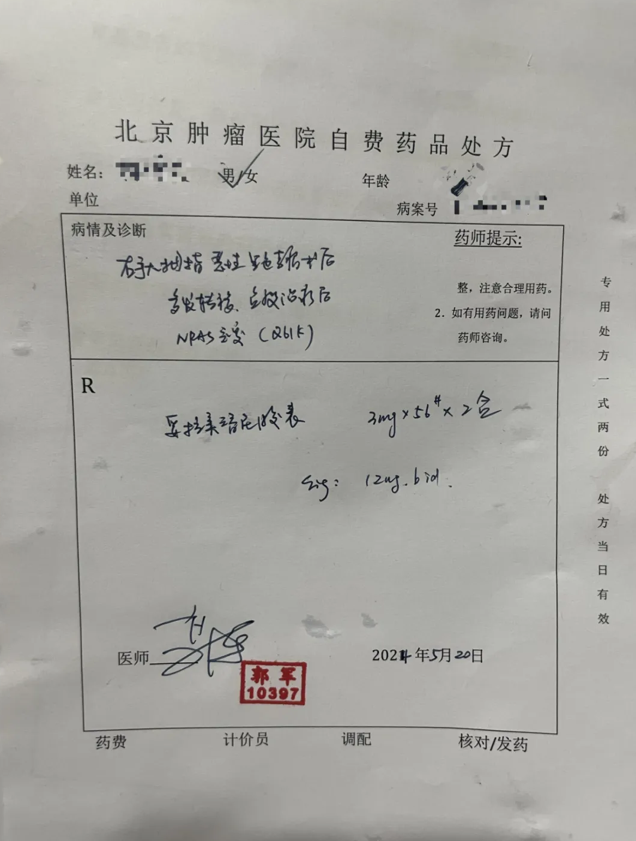
 Location:Home/News/Company News
Location:Home/News/Company NewsIn March 2024, Kolupin® (Tunlametinib) was approved in China for use in patients with advanced NRAS-mutant melanoma who have failed PD-1/PD-L1 therapy. This approval was based on the results of a single-arm, multi-center pivotal Phase II registration clinical study, which aims to evaluate the efficacy and safety of Kolupin® (Tunlametinib) in the treatment of patients with advanced NRAS-mutant melanoma. The ORR of the pivotal Phase II registration study was 35.8%. The drug was developed by KeChow Pharma and is the first MEK inhibitor independently developed in China. It is also the world’s first MEK inhibitor approved for the indication of advanced NRAS-mutant melanoma. On May 20, 2024, Professor Guo Jun of the Department of Melanoma and Sarcoma at Peking University Cancer Hospital made the first prescription for Kolupin® (Tunlametinib), marking the official entry of the drug into the domestic clinical application stage, bringing new treatment options for Chinese patients with advanced NRAS-mutant melanoma.

About NRAS-mutant melanoma
Malignant melanoma (MM) is a highly malignant tumor originating from epidermal melanocytes or nevi, primarily occurring in the skin and ranking third among skin malignancies. In China, there are approximately 20,000 new cases of melanoma every year, with the median age of onset between 50 and 69 years. Recently, the incidence has been rising rapidly, increasing the disease burden each year. Notably, there are significant differences in melanoma types between China and other countries. In Europe and the U.S., about 90% of cases are of the cutaneous type, which tends to have a relatively better prognosis. In contrast, in China and Asia, the more malignant acral and mucosal types predominate, accounting for approximately 50% and 20-30% of cases, respectively. NRAS-mutated melanoma is an aggressive, highly malignant and rapidly progressive subtype, comprising about 10.4-12.6% of all melanoma cases. This subtype shows low sensitivity to immunotherapy and chemotherapy, with studies indicating that the overall objective response rate (ORR) to anti-PD-1 treatments in Asian NRAS-mutant melanoma patients is around 6.1%.
About Kolupin
Kolupin® (Tunlametinib) is a highly selective MEK inhibitor independently developed in China. It targets MEK1/2 in the RAS-RAF-MEK-ERK signaling pathway, effectively blocking downstream signal transmission and inhibiting tumor growth. Kolupin can be used for patients with advanced NRAS-mutant melanoma who have failed anti-PD-1/PD-L1 treatment. It has a definite effect. The confirmed objective response rate (ORR) in the effectiveness analysis was 35.8%, the median progression-free survival (mPFS) was 4.2 months, and the median overall survival (mOS) was 13.7 months. The ORR of patients who had previously received immunotherapy reached 40.6%, and the overall safety was controllable and manageable. The recommended dosage is 12 mg, administered orally twice a day (approximately every 12 hours), either on an empty stomach or with meals.
About KeChow Pharma
KeChow Pharma is committed to innovation, fostering a “science-driven” corporate culture. The Company boasts a robust pipeline, highlighted by the MEK inhibitor Kolupin® (Tunlametinib), which has been approved for marketing in China. Several other products are currently under development, all aimed at addressing unmet clinical needs in China and globally. KeChow Pharma focuses on developing innovative small molecule drugs with best-in-class potential, meeting the clinical needs of patients worldwide and creating value for global health and well-being.
Disclaimer: This article is only for the purpose of exchanging the latest cutting-edge information, not for advertising purposes. If you need guidance on treatment plans, please go to a regular hospital for treatment!